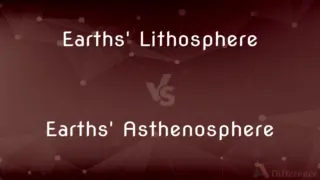Protestant vs. Puritan — What's the Difference?
Edited by Tayyaba Rehman — By Fiza Rafique — Updated on March 12, 2024
Protestantism is a broad Christian movement, while Puritanism is a strict, reformative subset within it, emphasizing purity in worship and personal life.

Difference Between Protestant and Puritan
Table of Contents
ADVERTISEMENT
Key Differences
Protestantism emerged in the 16th century as a movement against certain Roman Catholic doctrines and practices, advocating for salvation by faith alone and the authority of Scripture. Puritanism, on the other hand, arose in the late 16th century within the Church of England, seeking to purify and reform the church from within, emphasizing strict moral conduct and simplicity in worship.
While Protestantism encompasses a wide range of denominations with diverse beliefs and practices, Puritanism is known for its rigorous adherence to the Bible, plain and modest lifestyle, and a strong emphasis on personal piety and devotion. Protestants generally accept various forms of church governance and worship styles, whereas Puritans advocate for a congregational church structure and a simplified form of worship, free from what they considered unbiblical rituals and adornments.
In terms of theology, most Protestant denominations adhere to foundational beliefs such as justification by faith, the priesthood of all believers, and the authority of the Bible. Puritans, while sharing these beliefs, also stressed predestination and a visible saintly life as evidence of salvation, influencing societal norms and laws based on their strict moral code.
Culturally, Protestantism has influenced a broad spectrum of societal norms, values, and traditions across the world, contributing to the development of modern democracy, capitalism, and individualism. Puritanism, particularly in its American context, played a pivotal role in shaping early American society and governance, leaving a lasting legacy on American values like work ethic, morality, and education.
Comparison Chart
Origin
16th century, reaction to Catholic doctrines
Late 16th century, reform movement within Anglicanism
ADVERTISEMENT
Beliefs and Practices
Diverse, depending on denomination
Strict adherence to the Bible, simplicity in worship
Church Governance
Varies (e.g., episcopal, presbyterian, congregational)
Primarily congregational
Key Emphases
Salvation by faith, scripture authority
Personal piety, morality, predestination
Cultural Impact
Broad influence on Western society and values
Significant impact on early American society and values
Compare with Definitions
Protestant
Christian movement rejecting Catholicism's authority.
Protestantism led to the formation of various Christian denominations.
Puritan
Movement seeking to "purify" the Church of England.
Puritans opposed many Anglican church practices they found non-biblical.
Protestant
Influential in shaping modernity.
Protestantism's values have significantly impacted Western culture and democracy.
Puritan
Known for strict morality.
Puritan laws were often based on their interpretation of the Bible.
Protestant
Diverse in practices.
Protestant worship styles range from liturgical to contemporary.
Puritan
Advocated for simple worship.
Puritans eliminated church rituals they deemed superfluous.
Protestant
Emphasizes faith and scripture.
Protestants often stress reading and interpreting the Bible personally.
Puritan
Emphasized predestination and personal piety.
Puritans believed in living a life that reflected one's saved status.
Protestant
Founded on the Reformation.
Martin Luther's actions in 1517 are often marked as the start of Protestantism.
Puritan
Left a lasting legacy in America.
Puritan values influenced early American social and political life.
Protestant
A member of a Western Christian church whose faith and practice are founded on the principles of the Reformation, especially in the acceptance of the Bible as the sole source of revelation, in justification by faith alone, and in the universal priesthood of all the believers.
Puritan
A member of a group of English Protestants who in the 1500s and 1600s advocated strict religious discipline along with simplification of the ceremonies and creeds of the Church of England.
Protestant
A member of a Western Christian church adhering to the theologies of Luther, Calvin, or Zwingli.
Puritan
Puritan A person who is very strict or austere in religious practice or moral outlook, especially someone who regards pleasure or luxury as sinful.
Protestant
One of the German princes or cities that supported the doctrines of Luther and protested against the decision of the second Diet of Speyer (1529) to enforce the Edict of Worms (1521) and deny toleration to Lutherans.
Puritan
Of or relating to the Puritans or Puritanism.
Protestant
Protestant (also prə-tĕstənt) One who makes a declaration or avowal.
Puritan
Puritan Characteristic of a puritan; puritanical.
Protestant
Of or relating to Protestants or Protestantism.
Puritan
A puritanical person.
Protestant
Alternative case form of Protestant
A protestant effort
Protestant work ethic
Puritan
One who, in the time of Queen Elizabeth and the first two Stuarts, opposed traditional and formal usages, and advocated simpler forms of faith and worship than those established by law; - originally, a term of reproach. The Puritans formed the bulk of the early population of New England.
Protestant
Protesting.
Puritan
One who is scrupulous and strict in his religious life; - often used reproachfully or in contempt; one who has overstrict notions.
She would make a puritan of the devil.
Protestant
One who protests; a protester.
Puritan
Of or pertaining to the Puritans; resembling, or characteristic of, the Puritans.
Protestant
Alternative case form of Protestant
Puritan
Adheres to strict religious principles; opposed to sensual pleasures
Protestant
One who protests; - originally applied to those who adhered to Luther, and protested against, or made a solemn declaration of dissent from, a decree of the Emperor Charles V. and the Diet of Spires, in 1529, against the Reformers, and appealed to a general council; - now used in a popular sense to designate any Christian who does not belong to the Roman Catholic or the Greek Church.
Puritan
A person excessively concerned about propriety and decorum
Protestant
Making a protest; protesting.
Puritan
Morally rigorous and strict;
Blue laws
The puritan work ethic
Puritanic distaste for alcohol
She was anything but puritanical in her behavior
Protestant
Of or pertaining to the faith and practice of those Christians who reject the authority of the Roman Catholic Church; as, Protestant writers.
Protestant
An adherent of Protestantism
Protestant
The Protestant churches and denominations collectively
Protestant
Of or relating to Protestants or Protestantism;
Protestant churches
A Protestant denomination
Protestant
Making a protest
Common Curiosities
What distinguishes Protestantism from Puritanism?
Protestantism is a broad Christian movement that emerged as a reform against Catholic doctrines, while Puritanism is a specific group within Protestantism seeking further purification and reform of the Church of England.
How did Puritan beliefs influence American culture?
Puritan beliefs influenced American culture in its emphasis on hard work, morality, education, and democratic governance.
What are the main beliefs of Puritans?
Puritans emphasized strict adherence to the Bible, personal piety, predestination, and a simplified form of worship.
How do Protestant denominations differ from each other?
Protestant denominations differ in their interpretations of scripture, church governance, sacraments, and worship practices, reflecting the movement's diversity.
Are all Puritans Protestants?
Yes, all Puritans are Protestants, but not all Protestants are Puritans. Puritanism is a subset within the broader Protestant movement.
How did Protestantism impact society?
Protestantism influenced various aspects of Western society, including the development of democracy, capitalism, and individual rights.
Can Puritanism be found today?
While Puritanism as a distinct movement has largely dissolved, its influences can still be seen in some religious groups and cultural values, particularly in the United States.
Why did Puritans leave England for the New World?
Puritans left England for the New World to escape religious persecution and to establish communities based on their religious principles.
Did Puritanism contribute to the American Revolution?
While not a direct contributor, Puritan values of governance and social organization laid foundational principles that influenced American revolutionary ideas.
How does Puritanism compare to other Protestant reform movements?
Puritanism was more radical in its desire to purify and simplify the church compared to other reform movements that might have been content with broader reforms within existing structures.
How did Puritan views on predestination affect their society?
Puritan views on predestination led to a society focused on moral rectitude and the interpretation of personal and communal events as signs of divine favor or disfavor.
What was the goal of Puritanism?
The goal of Puritanism was to purify the Church of England from practices and beliefs they considered unbiblical, advocating for a return to a simpler, more devout Christian life.
What are some common misconceptions about Puritans?
Common misconceptions include the idea that Puritans were opposed to all forms of enjoyment and that they wore only black clothing; in reality, they valued community, family, and yes, they did partake in leisure activities within their moral framework.
What was the role of the Bible in Puritanism?
The Bible was central to Puritan life, guiding their moral conduct, worship practices, and community laws.
What is the significance of the Protestant Reformation?
The Protestant Reformation was significant for challenging the authority of the Catholic Church, leading to religious, cultural, and political changes across Europe.
Share Your Discovery

Previous Comparison
Shrubland vs. Woodland
Next Comparison
Coleoptile vs. ColeorhizaAuthor Spotlight
Written by
Fiza RafiqueFiza Rafique is a skilled content writer at AskDifference.com, where she meticulously refines and enhances written pieces. Drawing from her vast editorial expertise, Fiza ensures clarity, accuracy, and precision in every article. Passionate about language, she continually seeks to elevate the quality of content for readers worldwide.
Edited by
Tayyaba RehmanTayyaba Rehman is a distinguished writer, currently serving as a primary contributor to askdifference.com. As a researcher in semantics and etymology, Tayyaba's passion for the complexity of languages and their distinctions has found a perfect home on the platform. Tayyaba delves into the intricacies of language, distinguishing between commonly confused words and phrases, thereby providing clarity for readers worldwide.















































